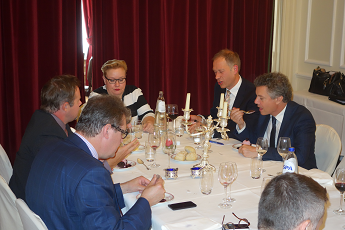
GLOBE EU is the cross-party group of European Parliament (EP) legislators acting as the ‘EU chapter’ of GLOBE International. GLOBE EU does not have the status of an EP intergroup. It was formally registered as a Belgian international non-profit association (AISBL) in 1992, company number 445.031.842. Its Rules of Procedure are public.
In parallel to its ongoing contributions to the work streams of GLOBE at international level, GLOBE EU is keen to serve as a platform within the European Parliament to discuss or advocate European Commission policy proposals and coordinate political action among like-minded legislators within the European Parliament and at member state level (together with GLOBE Europe). It seeks to facilitate structured discussions between MEPs, Commission officials, experts, and policy stakeholders by organizing high-level round tables, workshops and conferences.
Sirpa Pietikäinen MEP (Finland, European People’s Party) succeeded Anders Wijkman MEP (Sweden, European People’s Party) as President of GLOBE EU in July 2009.
The work of GLOBE EU is supported by a series of corporate partners via the Bee Group. Please visit the section ‘GLOBE EU and the Bee Group’ for more information concerning its governance and transparency provisions.
Vision and mission
The vision inspiring the work of the GLOBE community worldwide is that of a world in which nine billion people can live well, and within the planet’s resources, by mid-century.
To work towards this vision, GLOBE EU aims, more specifically:
- To improve understanding of the nature of environmental protection, especially uncovering the underlying root causes for the troubles of our planet; and promote policy tools to address the problems identified;
- To identify and gather suitable partners to contribute the latest information to the discussions as well as present new and innovative solutions;
- To find and promote systemic solutions to the risks posed by unsustainable practices (legal, financial, and political);
- To create opportunities for a structured exchange between stakeholders: i.e., legislators, the European Commission, the business community, and civil society representatives;
- To raise awareness on issues of strategic importance with members of the European Parliament and national parliamentarians and improve cooperation between them;
- To identify and reach out to new audiences to support the needed change.



